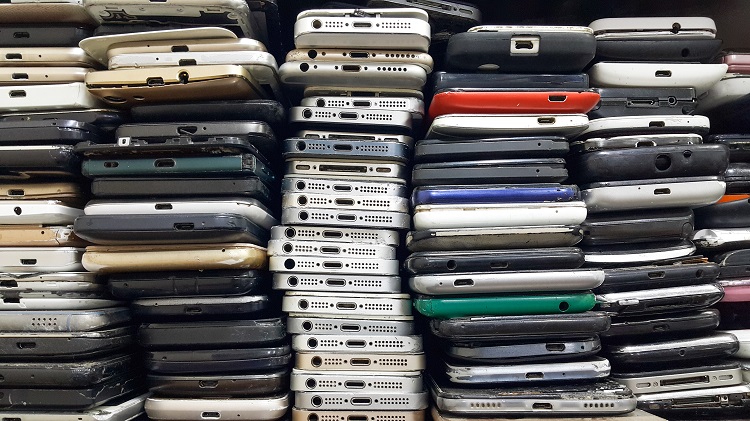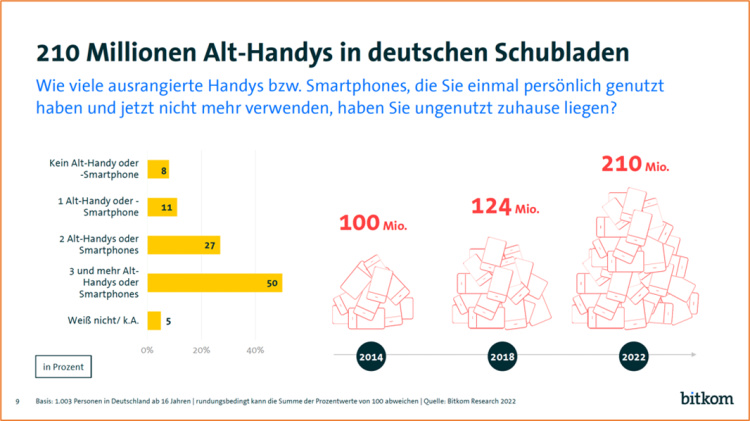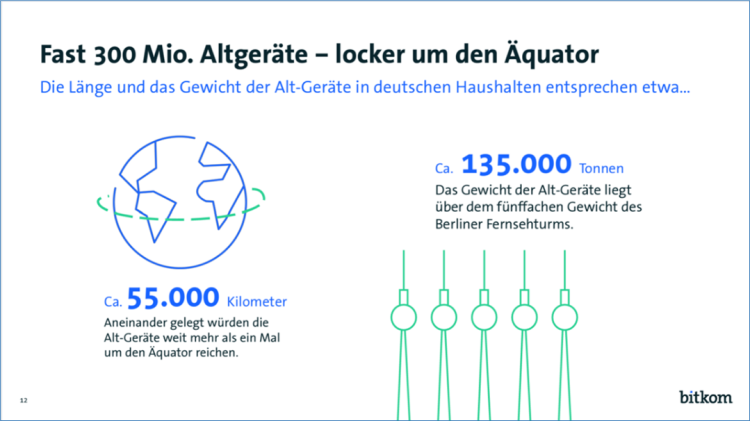 Background of damaged mobile phones. A bunch of broken smartphones. Used phones stacked on top of each other. Repair services and maintenance of equipment.
Background of damaged mobile phones. A bunch of broken smartphones. Used phones stacked on top of each other. Repair services and maintenance of equipment.
Treasure trove of raw materials hoarded: 210 million old mobile phones in German drawers
26. January 2023 Published by Raphael DoerrIt might not be as dramatic as searching for the lost Ark of the Covenant, like Harrison Ford as Indiana Jones in the movie. Nor is the search for the treasure quite as demanding and dangerous as the search for the Ark, but it’s still worth it. After all, Germans apparently have a huge treasure of raw materials hoarded in apartments, sheds, garages and houses. According to Bernhard Rohleder, CEO of the Bitkom association, we are talking here about around 6,600 tonnes of aluminum, 1,400 tonnes of cobalt, 180 tonnes of lithium, 140 tonnes of magnesium, 60 tonnes of titanium, as well as phosphor, tantalum, platinum metals, rare earths, and around three tonnes of gold. This vast treasure of raw materials lies hidden in drawers and cupboards, or to be more precise, inside more than 200 million old, used and defective mobile phones, as the IT industry association reports. Added to that are a further 26 million tablets and 49 million laptops and notebooks. All combined they amount to a huge amount of valuable resources that will be urgently needed in the future.

“Smartphones, tablets or laptops that still work should be passed on and reused, while defective devices should be disposed of properly and recycled,” is what Bitkom CEO Bernhard Rohleder calls for. That makes the mountain of old devices and electronic waste longer than the circumference of the equator and five times heavier than the Berlin TV tower, according to Bitkom’s calculations. In total, 87 percent of Germans own at least one unused mobile phone or smartphone, 47 percent own own at least one or more unused laptops, and 20 percent own one or more discarded tablets.

Worldwide, the situation is even more dramatic. According to estimates, roughly 5.3 billion of the around 16 billion mobile phones worldwide will become waste this year, as the Münchner Merkur newspaper reports. Only a small part of them will be disposed of properly, as the electronic waste recycling association WEEE Forum in Brussels and the United Nations Institute for Training and Research (UNITAR) in Geneva report. Stacked flat atop one another at an average depth of nine millimeters, the tower of all the disused devices disused devices would rise to roughly 50,000 kilometers. In European households, according to the report, an average of 13 electrical and electronic devices are being hoarded, even though they are no longer used or are broken. Accordingly, the average household contains 74 electrical and electronic devices such as phones, tablets, laptops, electric tools, hair dryers, and toasters.
“People tend not to realize that all of these apparently insignificant objects are of great value and, combined at global level, represent massive volumes,” said Pascal Leroy, Director General of the WEEE Forum. “In 2022 alone, small electronic items such as mobile phone, electric toothbrushes, toasters and cameras, that are produced worldwide, will amount to an estimated total of 24.5 million tonnes – four times the weight of the Great Pyramid of Giza,” as Magdalena Charytanowicz of the WEEE Forum explained. The international association is vigorously committed to setting up a circular economy for electronic waste.
Delete properly, but how?
According to a survey in the UK, 44 percent of people don’t know how to delete all the personal data on their smartphone properly, so that it cannot be recovered again. That is one of the main reasons why the old devices are kept for so long. “It’s somehow strange to throw away things like that. As a layperson you don’t know how to delete all the data on them, and if you have somehow managed to wipe it, you have no idea whether or not you’ve really deleted it. Or if a personal secret was hidden somewhere and is now being used against you by the worldwide Internet criminal cooperative,” as Bruno observes in series “The best from all over the world” written by German author Axel Hacke and published in the SZ Magazine.
Factory reset
Alongside various login details, the sensitive and personal data that people have entrusted to their smartphone over time includes passwords, in particular data and access to online banking, credit cards and bank accounts. And deleting this data properly and securely isn’t quite as easy as you would assume. Traditionally, the fact is that smartphones don’t really delete data when you click on “Delete”. Because it’s a lot faster, they simply reset the memory directory. It’s a bit like if you wanted to tear down a library by throwing away the index cards that list which books there are and on which shelf they can be found. But the books always remain in the same place. Everyone can read them and, with a bit of effort, even create a new index. Both Apple and Google have extended their operating systems so that they encrypt the contents of the memory. Once that has been done, all the operating system needs to then do when resetting to factory settings is to simply destroy the decryption key. To come back to our library example: That would be as if all the books were written in a cypher that no-one can now decrypt. If you use the “Reset device” or “Factory settings” function, you can therefore be certain that sensitive data will also be deleted completely.
Back to the manufacturer
In addition, simply tossing a mobile phone into the normal garbage can is strictly prohibited, since every mobile phone contains up to 30 different metals as well as harmful substances that may find their way at the landfill into the ground and hence into the drinking water. Anyone who wants to delete their private data on the smartphone properly should know that it’s not enough to simply delete it or format the hard drive.
Anyone who wants to dispose of their old mobile phone properly can find out more on the Internet and take it to the nearest recycling depot, or send it to the manufacturer, who will then dispose of it, as Gigaset does with its take-back program. Alongside the trip to the recycling depot and the local retail store, the program offers a further opportunity to dispose of old phones or smartphones free of charge – whether they’re Gigaset phones or from other manufacturers. And the state of the device is irrelevant. The devices sent in are inspected and disposed of properly by Gigaset’s certified partners. In return, customers will receive a voucher for 15% off all products for their next purchase in the Gigaset online shop.
 Comments
Comments

 en
en 







